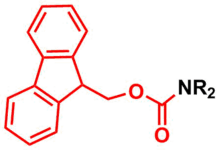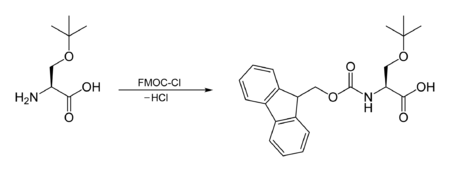Fluorenylmethyloxycarbonyl protecting group
The fluorenylmethoxycarbonyl protecting group (Fmoc) is a base-labile protecting group used in organic synthesis.

Reactions
Fmoc carbamate is frequently used as a protecting group for amines, where the Fmoc group can be introduced by reacting the amine with fluorenylmethyloxycarbonyl chloride (Fmoc-Cl), e.g.:[1]
The other common method for introducing the Fmoc group is through 9-fluorenylmethylsuccinimidyl carbonate (Fmoc-OSu), which may itself be obtained by the reaction of Fmoc-Cl with the dicyclohexylammonium salt of N-hydroxysuccinimide.[2]
It may be cleaved by bases, typically a solution of piperidine:
Fmoc protection has found significant use in solid phase peptide synthesis because its removal with piperidine solution does not disturb the acid labile linker between the peptide and the resin.[3]
Because the fluorenyl group is highly fluorescent, certain UV-inactive compounds may be reacted to give the Fmoc derivatives, suitable for analysis by reversed phase HPLC. Analytical uses of Fmoc-Cl that do not use chromatography may be limited by the requirement that excess Fmoc-Cl be removed before an analysis of fluorescence.
Common amine protection methods
- Fluorenylmethyloxycarbonyl chloride or 9-fluorenylmethyloxycarbonyl azide (itself made by reacting Fmoc-Cl with sodium azide), sodium bicarbonate and aqueous dioxane[4]
Common amine deprotection methods
- 20% piperidine in dimethylformamide (Fmoc group has an approximate half life of 6 seconds in this solution)[5]
References
- Yamada, Kazuhiko; Hashizume, Daisuke; Shimizu, Tadashi; Ohki, Shinobu; Yokoyama, Shigeyuki (2008). "A solid-state 17O NMR, X-ray, and quantum chemical study of N-α-Fmoc-protected amino acids". Journal of Molecular Structure. 888 (1–3): 187–196. doi:10.1016/j.molstruc.2007.11.059.
- Paquet, A. (1982). "Introduction of 9-fluorenylmethyloxycarbonyl, trichloroethoxycarbonyl, and benzyloxycarbonyl amine protecting groups into O-unprotected hydroxyamino acids using succinimidyl carbonates". Canadian Journal of Chemistry. 60 (8): 976–980. doi:10.1139/v82-146. Archived from the original on 2012-07-26.
- J. Jones, Amino Acid and Peptide Synthesis, 2nd edn., Oxford University Press, 2002
- Carpino, Louis A.; Han, Grace Y. (1972). "9-Fluorenylmethoxycarbonyl amino-protecting group". The Journal of Organic Chemistry. 37 (22): 3404–3409. doi:10.1021/jo00795a005.
- Wuts, P; Green, T (2006); "Greene's Protective Groups in Organic Synthesis"; DOI: 10.1002/9780470053485.

